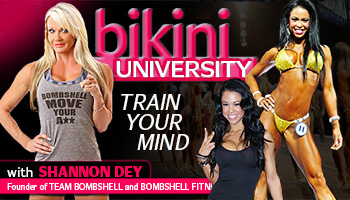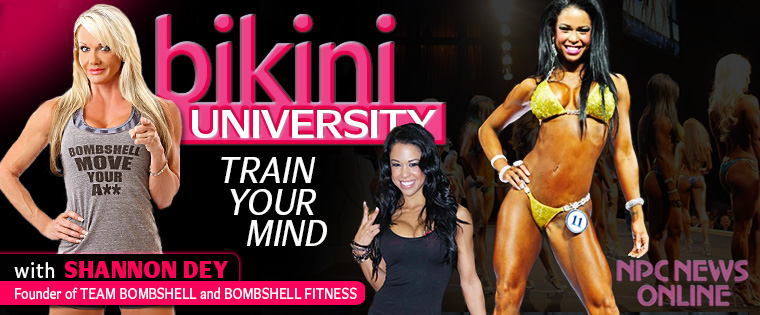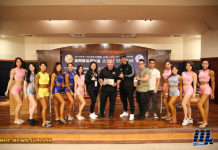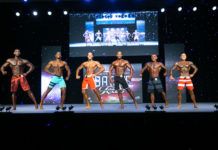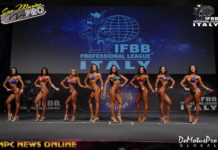As NPC Athletes you spend countless hours in the gym perfecting your physique. But how much time to you spend training your mind?
Competing is not simply all about the body; there is a mental component as well. You must present your physique properly with poise, grace and confidence under the enormous apprehension of being judged, the distraction of the crowd and sometimes simply the overwhelming pressure of standing on that big stage!
How do you train your mind? Let’s try an exercise in mental fitness. Carefully read the following paragraph:
As you step on to the stage, you can feel the heat of the lights and hear the click of your heels on the wood. Your gait is natural, smooth and energetic. You look down at the judging panel and smile confidently. When you reach the “x” marking the center of the stage, you flawlessly flow into your front pose. Your pose is perfect; stomach held tight, arms relaxed and you feel the inner strength and confidence of a job well done.
Now, take a moment, close your eyes and visualize yourself taking the stage at your next contest and executing the scenario exactly as outlined in the above paragraph. Make sure to actually feel all of the physical sensations that surround being on stage, and internalize the resulting confidence of a perfect performance.
The mental exercise that you just performed is a form of imagery utilizing research proven sport psychology methods. Imagery is a very common practice in the field of sport psychology and can assist you with everything from mastering your posing skills to controlling your nerves and exuding self-confidence on stage. Think it sounds silly? Think again!
Numerous studies have been conducted and theories created concerning the utilization of imagery in all levels of sport. One of the most utilized theories is the bio-informational theory developed by a researcher named Peter J. Lang at the University of Wisconsin. The bio-informational theory proposes that during imagery, the brain stores an organized set of stimulus and response to stimulus in the long term memory. Due to the memory storage created by repeated imagery, individuals become skilled at matching the proper response to the given stimulus. Therefore when the individual is actually exposed to the stimulus (situation and/or environment), their response will more likely be appropriate in emotional, psychological and physiological nature to that particular stimulus. By rehearsing desired responses to the given stimulus, the athlete is more likely to engage in proper outcome.
In the competitive world, this means that by practicing imagery of flawlessly executing your posing routine in your mind, you can actually TRAIN your body to respond appropriately when you hit the stage! By practicing your response (perfect posing and confidence) in relation to the stimulus (all of the sensations that are a part of the stage experience) you can greater increase your ability to perform well during competition.
There are many different types of imagery you can practice. Here are a few that will prove most helpful in the world of NPC Bikini competitions:
1 Cognitive Specific (CS)
When you picture yourself flawlessly executing your posing routine, you are practicing CS imagery. CS imagery includes imagery based on specific skills, is utilized to aid in positive skill related outcomes and has proven effective in learning skills and performing them properly. By performing the various poses over and over in your mind in real-time, you are more likely to perform them correctly once you hit the stage.
2 Motivational General – Arousal (MG-A)
This type of imagery is designed to control your stress and arousal levels based on what emotional response is best for you. Some Athletes do best when they are excited and amped up, others perform optimally when they are extremely calm. For most, their optimal arousal level is somewhere in between. Whatever emotion level in which YOU perform best is the emotion you should strive to feel while envisioning yourself on stage.
3 Motivational General-Mastery (MG-M)
Motivational General-Mastery (MG-M) is envisioning the state of being self-confident and positive during performance. Self-confidence isn’t something that one is born with, it is created by positive self-talk and learning what it FEELS like to have confidence! By being confident and positive, you are much more likely to remain focused, perform well and stay in control of your emotion. MG-M may also be a byproduct of the other above listed types of imagery. By mastering imagery of proper skill execution (CS), and controlling your stress levels (MG-A), the ability to feel self-confidence gained through such mastery is often subsequently created.
As athletes, you spend countless hours in the gym perfecting your physique but more often than not, little to no time is spent training your mind for success. Competing in our sport is not only about the body, it has a mental component as well. You must present your physique properly with poise, grace and confidence under the pressure of being judged in front of a crowd and simply standing on that big stage! Over the years, I have seen countless beautiful physiques not place well in competition due to poor posing, lack of confidence and uncontrolled nerves. By utilizing the proven imagery practices found in sport psychology, you can actually TRAIN your mind to trigger your body into ROCKIN performance on stage!
References
Dosil, J. (2006). The sport psychologist’s handbook: A guide to sport-specific performance enhancement. West Sussex, England: John Wiley & Sons.
Nordin, S. & Cumming, J. (2008). Types and functions of athletes’ imagery: Testing predictions from the applied model of imagery use by examining effectiveness. International Journal of Sport and Exercise Psychology, 6, 189-206.
Post, P. (2012). A phenomenological investigation of gymnasts lived experience of imagery. The Sport Psychologist, 26, 98-121.
ABOUT SHANNON DEY
 IFBB Fitness Professional Shannon Dey is the Founder of Bombshell Fitness and Team Bombshell. Over the past three years, Bombshell Athletes have earned 65+ IFBB Pro Cards, and Team Bombshell has produced two IFBB Bikini Olympia champions. In the 2012 Bikini Olympia, four of the top five finishers were Bombshell Athletes.
IFBB Fitness Professional Shannon Dey is the Founder of Bombshell Fitness and Team Bombshell. Over the past three years, Bombshell Athletes have earned 65+ IFBB Pro Cards, and Team Bombshell has produced two IFBB Bikini Olympia champions. In the 2012 Bikini Olympia, four of the top five finishers were Bombshell Athletes.
Shannon holds a Masters Degree in Health Education and is currently working toward her Ph.D. in Sports Psychology. For more information on Bombshell Fitness and Team Bombshell, visit their website at www.bombshellfitness.com or visit the Team Bombshell Facebook page.

